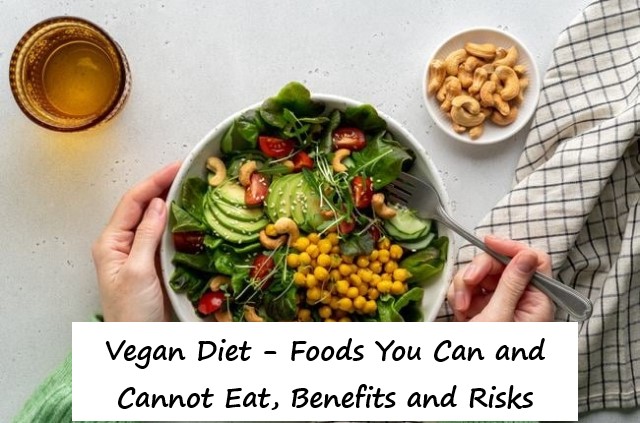Vegan Diet – Foods You Can and Cannot Eat, Benefits and Risks

If you invite a dinner guest who’s a vegan, you’ll want to check your menu carefully to make sure it follows two basic rules. Foods from plants are OK, but foods from animals are off limits, including common ingredients like eggs, cheese, milk, and honey.
About 3% of Americans follow a vegan diet. Their reasons for eating this way vary. Some vegans do it to improve their health. A plant-based diet could lower the risk for certain diseases. Others stay away from meat because they don’t want to harm animals or because they want to protect the environment.
If you’ve thought about trying a vegan diet, you might wonder if this way of eating is right for you so we https://thevegangarden.com/ will give information that will help you to deciding. Although you can get some real benefits from going meatless, there are a few challenges, too.

What You Can Eat
On a vegan diet, you can eat foods made from plants, including:
- Fruits and vegetables
- Legumes such as peas, beans, and lentils
- Nuts and seeds
- Breads, rice, and pasta
- Dairy alternatives such as soymilk, coconut milk, and almond milk
- Vegetable oils
What You Can’t Eat
Vegans can’t eat any foods made from animals, including:
- Beef, pork, lamb, and other red meat
- Chicken, duck, and other poultry
- Fish or shellfish such as crabs, clams, and mussels
- Eggs
- Cheese, butter
- Milk, cream, ice cream, and other dairy products
- Mayonnaise (because it includes egg yolks)
- Honey
Health Benefits
Studies show that vegans have better heart health and lower odds of having certain diseases. Those who skip meat have less of a chance of becoming obese or getting heart disease, high cholesterol, and high blood pressure. Vegans are also less likely to get diabetes and some kinds of cancer, especially cancers of the GI tract and the breast, ovaries, and uterus in women.
Going vegan might even help you live longer, especially if you also cut down on your daily calories.
Better weight control may be one reason for all of these health benefits. Vegans have a lower body mass index (BMI) than people who eat animal-based products.
Good nutrition is another perk. Fruits, vegetables, whole grains, and nuts are staples of the vegan diet. These foods are rich in fiber, antioxidants, and compounds that help protect against diseases like diabetes and cancer.
Risks
A vegan diet is healthy overall, but avoiding animal protein can shortchange you on a few nutrients, like protein, calcium, omega-3 fatty acids, zinc, vitamin B12, and vitamin D. You need protein to power all the chemical reactions in your body. Calcium strengthens your bones and teeth. Omega-3 fatty acids keep your cells healthy and protect your heart by shielding against heart disease and stroke. These nutrients are especially important for children’s growing bodies and for pregnant women.
You can find substitutes for most of these essential nutrients in plant-based foods like:
- Protein: nuts, soy, beans, quinoa
- Calcium: soy milk, fortified orange juice, tofu with calcium, broccoli, kale, almonds
- Omega-3 fatty acids: flaxseeds, vegetable oils, plant-based supplements
- Iron: tofu, soy nuts, spinach, peanut butter, fortified cereals
One nutrient that’s impossible to get from plant sources alone is vitamin B12, which your body uses to make red blood cells and DNA. You’ll only find B12 in animal products. If you go vegan, you may need a supplement to make up for what you don’t get from your diet.
Keep in mind that a vegan diet is only as healthy as you make it. Products like “vegan” ice cream, cookies, and candy are tempting, but you don’t want to overdo. If you eat high-fat and processed foods and supersize your portions, you’ll gain weight and might end up with many of the same health problems you’d have on a meat-based diet.
How to Go Vegan
Does the idea of a vegan diet interest you, but you’re not sure how to start? If you want, you could plunge right in and cut out all poultry, meat, eggs, and dairy at once. Or, take a more gradual approach and increase the amount of fruits and vegetables you eat at each meal.
If removing all animal products from your diet feels overwhelming, try a less strict approach. Some diets focus on plants, but still leave wiggle room for other types of foods:
- Pescatarian: no meat and poultry, but you can still eat fish
- Lacto-ovo vegetarian: plant-based diet, plus dairy and eggs
- Flexitarian: plant-based diet that on occasion includes animal products.
Your doctor or a dietitian can help you choose the right foods as you start a vegan diet. It’s very important to get help from an expert if you have a long-term condition or you’re pregnant, to make sure you get the right mix of nutrients in your new eating plan.
